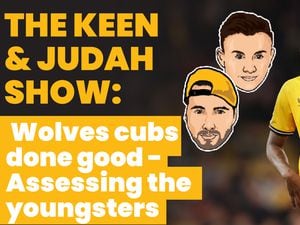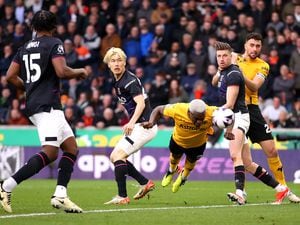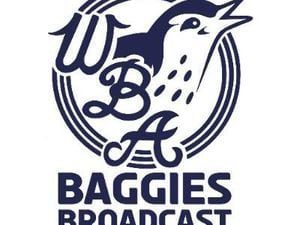Five... Wolves cult heroes
In our new feature we bring you a left-field flavour of all things Wolves, starting with cult heroes.
Anyone with gold and black blood running through their veins has a Wolves hero.
Typically this would be the first player you idolised as a rambunctious youngster, the first one you imagined being when whacking a half deflated Mitre football back and forth against a fence, wall, shed or, as Five... did, a window frame, duly breaking said window frame and costing angry parents many British pounds.
Your first hero remains encapsulated in those early memories, their god-like status forever undimmed.
The lion's share of Wolves fans would probably name their hero as one of Bully, Waggy, Broadbent, Richards, Wright or Dougan. What a list.
A cult hero, though, is a different beast altogether.
These are the players who catch your eye for a reason other than skill. Cult heroes can be unpolished diamonds, or, as the dictionary defines the term, 'a misplaced or excessive admiration for a particular person or thing'.
A cult hero should be a player that the supporter of another team won't necessarily have heard of.
But Wolves fans, they know. They all about Eric Young's headband. Wolves even gave away paper Eric Young headbands, such was his short-lived popularity.
But they missed a trick a couple of years earlier – if they'd sold John de Wolf wigs for £5 a pop they'd have made thousands, for here was the embodiment of a cult hero.
De Wolf took penalties, he scored a hat-trick, he wound up opposition players, he launched into sliding tackles, he was called Wolf and he played for Wolves – what more do you want.
Calling his haircut a haircut wouldn't come close to doing those long bountiful locks justice – it was a mane.
Winning a throw near the opposition penalty area was an event when De Wolf was playing – he would loll slowly up-field and fling the ball into the box, an attribute a burly centre half has no right to possess. But that was De Wolf.
Injuries would cruelly curtail his Wolves existence but the memories remain. That 'De Wolf Man' chant, that unmistakable grin, that beard, that penalty in the shoot-out against Sheffield Wednesday, that last-minute equaliser from the spot against Sheffield United.
Yes he sometimes looked like a 10-ton HGV trying to turn round in a cul-de-sac , and yes he was occasionally slower than a snail in treacle.
But he was John De Wolf. Wolves' cult hero for two unforgettable years.
Billy 'Artillery' Hartill
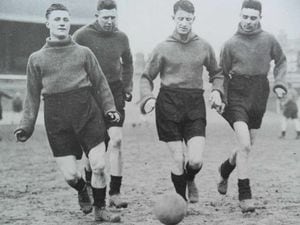
Scoring a few goals will get you far in the Wolves cult hero stakes.
Dean Sturridge will tell you that, as will Sylvan Ebanks-Blake. Come to think of it, not scoring goals conversely works too – as Campbell Chapman and John Paskin can attest to.
Tomasz Frankowski doesn't fall into that bracket though – there were no redeeming features to The Pole With No Goal.
Henri Camara ticked both those boxes, by not scoring for a while and then scoring quite a few in fairly quick succession.
Although many Wolves fans may have erased it from their memories, future hate figure Camara was actually extremely popular for a few months.
If you think about it long and hard you might actually remember taking a Senegalese flag to Molineux on the final day of the 2003/04 season. Or a 'please stay' banner. Come on, own up.
Camara was arguably Dave Jones' flagship signing as Wolves played it safe and steady in the transfer market after a belated promotion to the Premier League, befuddling success-thirsty fans used to years of gluttonous overspending in the second tier.
And despite an early lack of goals, most notably at Old Trafford where £1.5m Camara had enough chances for a hat-trick in a tight 1-0 defeat, Camara had a certain wow factor.
Lightning quick – as in quick enough to give Jonathan Woodgate a five-yard head start and then run the wrong side of the then-Leeds defender to beat him to the ball – and not short of skill, Camara was the underdog Wolves fans were rooting for.
He broke his duck after seven games in the legendary 4-3 comeback win over Leicester and more goals were expected thereafter. But 16 – yes 16 – goalless games followed.
And then, incomprehensibly, Camara went off the scale, netting five in five successive matches, against Chelsea, Southampton, Manchester City, Bolton and Middlesbrough.
He was unplayable, he was brilliant, he played up to the crowd, he scored a 25-yarder against Everton. Henri, please stay! But, like Wolves' survival hopes, it was too little too late and Camara's mind was made up – he wanted to leave.
He did it in the least ethical way, of course, going on strike and earning the predictable but in this case warranted Judas tag. And that's why he can't make this list.
The word 'hero' cannot go near Camara's name, not for Wolves. Instead Five... turns to a man who was in the Army and then played football.
Not Guy Whittingham, but Billy 'Artillery' Hartill.
Born in Walsall, Hartill enlisted in the Royal Horse Artillery and as a Bombardier played for the Army, netting 70 goals in two seasons before leaving the services to join Wolves in 1928.
He only spent six full seasons at Wolves, under Major Frank Buckley, but JUST LOOK at the goals he scored.
A total of 170 in 234 matches. Thirty-three in 1929/30, then 24, 30, 33, 13 (from 26 games) and 27 in a season-by-season record to rival anyone's (the first three seasons being in Division Two, the second three in Division One).
He was our Dixie Dean, our Steve Bloomer. His scoring feats were the stuff of legend – a run of 10 in FOUR games in 1929/30, hat-tricks in consecutive matches in 1933, 15 hat-tricks in total, scoring all five in a game not once but twice, against Notts County (5-1) in 1929 and Aston Villa (5-2) in 1934.
He left in 1935, God knows why, he'd have scored enough to set unbreakable Wolves records if he'd stayed, and after short and fruitless spells for Everton and Liverpool he soon retired.
Anyway, even if he was far too good to be labelled so at the time, the intervening decades have seen Hartill become a proper cult hero in Wolves' fans eyes. Sorry Henri (not sorry).
Shane Westley
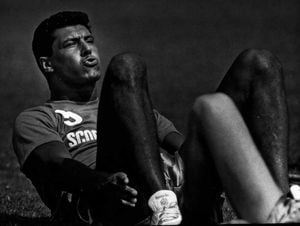
Football fans generally prefer players who they feel they can relate to.
You know, the youth-teamer made good (Danny Batth), the working class factory lad-turned-footballer (Steve Bull), the lower league signing we all think we could be if a top scout came to watch some Sunday League (Michael Kightly).
And, if we're being honest, most Wolves fans are a little bit off the wall, a little bit crazy, a little bit mental.
And Shane Westley was mental. Proper mental.
There have been a few of these over the years. Kevin Muscat was one. Keith Curle another. And John McAlle. Then there was Keith 'psycho' Downing. Marcus Hahnemann was as left-field as it gets.
Westley though played in what will forever be known as the last Wolves team that fans could genuinely relate to.
Graham Turner's down-to-earth, hard working, battle-hardened lot were all that Wolves fans ever needed – until they couldn't make that final leap to the top flight.
They trained on a car park, they weren't paid a lot of money, they were honest and they gave their all. They also weren't, Bully aside, gifted footballers. And Westley embodied this.
Long before another cult hero George Elokobi rocked up at Molineux with a neck almost as wide as his torso, the area between Westley's chin and shoulders was big enough to display an art exhibition.
Strength was his biggest asset and Westley made the most of it, barging into anyone who dared stand in his way.
Westley was a monster, a brute, a giant. A chant of 'Westley, nut the ref, Westley Westley nut the ref' was not uncommon at Molineux.
A proper nutter, when players could still be nutters.
Mo Camara
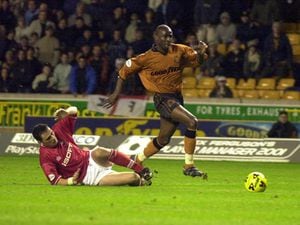
There's something about a foreigner embracing English football, or Wolves, or the Wolves Way™(a phrase the club used recently, similar to the West Ham Way™ presumably, whatever that means) that really captures the imagination.
Their acceptance and endorsement of our game gives them credence and we love them for it. With overseas players now commonplace this has become less of a novelty than it was when, say, Ossie Ardiles was at Spurs, John Jensen at Arsenal or even Diego Forlan at Manchester United.
In the late 1990s to early 2000s clubs cottoned on to the fact a foreign footballer could be imported cheaply, in fact he would often be far cheaper than his English equivalent but just as talented.
Wolves were no different in this regard. Fernando Gomez (Spanish), Jens Dowe (German), Jesus Sanjuan (Spanish), Mark Williams (South African), Havard Flo (Norwegian), Cedric Roussell (Belgian), Silas (Portuguese), Oleg Luzhny (Ukrainian), Serge Romano (French) and Robert Niestroj (Polish) all came and went. And all were average at best.
The perpetually bandaged Ludovic 'Ludo' Pollet broke the mould, and did so effortlessly.
But for Guinea international Mo Camara, being brilliant at football didn't come effortlessly.
Or, if it did, he certainly had us all fooled by making it look like it was the most unnatural pursuit in the world for him to take up.
The word 'ungainly' does not do Mo Camara justice. Bambi on rollerskates on a banana on ice had nothing on Mo.
Joining in 2000 from French side Le Harve (at the same time Steeve Epesse Titi and trialists Sami Al-Jaber and Cyril Eboki also began their Wolves adventures – yes this was the foreign bargain basement at its best/worst) as Pollet had done a year earlier, 'super' Mo was merely expected to be a largely anonymous back-up to Bloxwich's finest, Lee Naylor, who had made the left-back slot his own despite still being 20 years old at this time.
But Camara, five years Naylor's senior, soon caught Colin Lee's eye and was bounding uncontrollably up and down that left flank with all the composure of Frank Spencer in a small antique shop that sells fine, easily-breakable china.
For every trait he possessed a weakness – Mo was quick but directionless, committed but foolhardy, fearless but lacking technical ability.
He gave it a go though didn't it? You couldn't knock the ambition of a man who thought he could score 30-yard screamers, even if some shots actually ended up out the ground (this really happened).
And Mo, like De Wolf, played football with a smile. During an unforgettable away-day at Stockport the ball bounced into the stand (not from Mo's boot, for once) where the Wolves fans were housed.
As they started up a chant of 'super Mo Camara) the biggest smile you could imagine was spread over his joyous face.
Here was a man who genuinely loved playing for Wolves. With the crash and burn of 2002 Wolves got serious and Mo was on his way out, later playing for Celtic (Celtic!!), Burnley and Derby.
But hopefully for Mo his heart remained at Molineux.
Peter Knowles
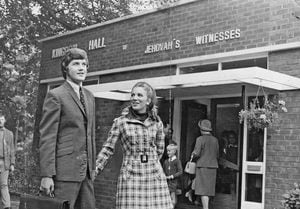
For a generation of Wolves fans, and indeed for a few more after that, Peter Knowles was the one that got away.
The term 'prodigious talent' could have been invented for Knowles, arguably the most gifted youngster that Wolves ever blooded. Certainly for supporters who frequented Molineux in the late 1960s he was the best player they ever saw in gold and black.
The story is a well told one, and it doesn't become any less regret-filled over the years.
Two great feet, intelligent, incredible skill, an unnervingly accurate passer or the ball who regularly found the net from midfield – Knowles had it all.
He could have done anything in the game, he could have played for England in the 1970 World Cup, he could have led Wolves to a glut of trophies.
Team mate Mike Bailey said in 2009: "I saw him last week at Bobby Thomson's funeral – I told him he had the world at his feet. He would have become an England regular.
"I said we could have gone on to win a lot more trophies with him in the side because he was that type of player – he would have been a superstar."
With his Beatles haircut and his confident swagger, Knowles was Wolves' George Best.
But, aged 23, he gave it all up to become a Jehovah's Witness.
Imagine someone like Jack Wilshere jacking it all it now to try his hand at being a Trappist monk and you've got some scale of the bombshell Knowles unloaded on Wolves.
The club kept his registration for 13 more years in the hope he'd change his mind. But of course he never did.
And God's Footballer, as termed by Billy Bragg in his 1991 song about Knowles, remains the one that got away.
A total waste of talent, football fans will always say. And that's true to an extent, but it wasn't a waste to him. Not in the slightest.
As the man himself said in the late 1980s: "Leaving football was the best thing I ever did – the best decision of my life. I am happy now and I have total peace of mind.
"I have absolutely no regrets whatsoever."
Still, in his absence, the Jehovah's Witness has unwittingly almost become a cult of his own – the cult of Peter Knowles. Long may it live on.

